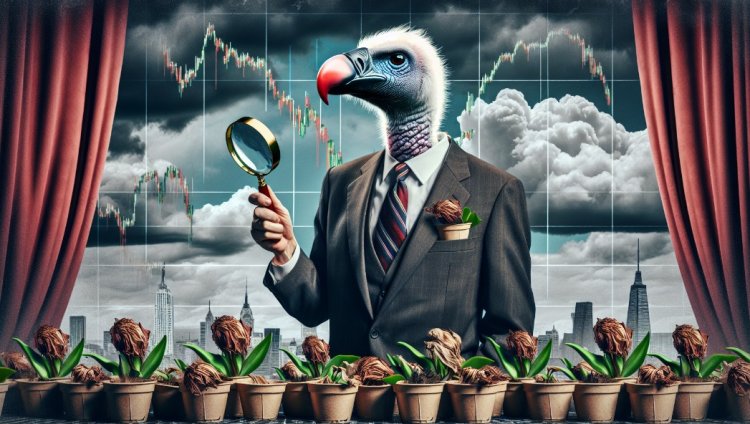Howard Marks: The Vulture Investor
Dive into the world of Howard Marks, the Vulture Investor, and uncover the strategies and insights that shaped his successful investment career.

Howard Marks: The Vulture Investor
Introduction
In the world of finance, there is a unique breed of investors known as vulture investors. These investors have endured the test of time by employing discipline and rationality to make profits when others lose. One standout vulture investor is Howard Marks, who has achieved great success in this field. With a net worth of $150 billion, Marks has proven his expertise and unique investment strategies.
What sets Mark apart is his ability to question and be skeptical about the status quo. This tendency to question has allowed him to develop a strong sense of discipline and rationality when it comes to investing. He understands the importance of not being swayed by emotions or popular opinion but instead relying on careful analysis and a deep understanding of the market.
Mark's success can be attributed to his approach to finding value in places where others dare not look. He is willing to invest in distressed companies and assets, taking advantage of the market's pessimism and undervaluation. This approach requires a high level of discipline, as it involves patiently waiting for the right opportunities and being prepared to act when others are fearful.
In the following sections, we will delve deeper into Mark's investment philosophy and the key principles that have contributed to his success as a vulture investor.
Early life and education
Howard Marks, the renowned vulture investor, grew up in a prosperous middle-class family in Queens. Raised in a Jewish family in Regal Park, Queens, Marks had the privilege of growing up in a neighborhood where money was rarely a concern. However, beneath the surface of their peaceful family life, there were struggles that Marks had to navigate.
One significant struggle in Mark's early life was his mother's battle with multiple near-fatal illnesses. This forced her to stay at home and rendered her unable to work. Desperate for a cure, Mark's mother turned to Christian Science, embracing her religious beliefs in Christ as a means of overcoming her illness. This stark departure from her Jewish upbringing posed a challenge for Marks, who began questioning religion and the concept of absolute certainty.
Mark's tendency to question and be skeptical from a young age would ultimately shape his mindset as an investor. This innate curiosity and critical thinking allowed him to challenge the status quo and develop his own unique investment philosophy.
Upbringing in a Prosperous Middle-Class Family
Growing up in a prosperous middle-class family in Queens, Marks enjoyed a comfortable lifestyle. His father, a successful accountant, ensured that money was never a pressing concern for the family. This financial stability provided Marks with a strong foundation to pursue his ambitions and explore his interests.
His Mother's Battle with Illness and Religious Beliefs
Mark's mother's battle with multiple near-fatal illnesses had a profound impact on his upbringing. Witnessing his mother's struggle and her eventual turn to Christian science challenged Marks's own beliefs and sparked his tendency to question and be sceptical. This formative experience planted the seeds of skepticism and critical thinking that would serve Mark well in his future endeavours.
Tendency to Question and Be Sceptical from a Young Age
From a young age, Marks displayed a natural inclination to question and be skeptical. He was not content with accepting things at face value and sought a deeper understanding of the world around him. This tendency to question and challenge the status quo would become one of his defining traits as an investor.
Dreaming big and choosing finance
Despite facing low chances of acceptance, Marks had a strong desire to attend Wharton. With the guidance of a supportive accounting teacher, Marks was able to secure a spot at Wharton, which changed the trajectory of his life. This experience highlights the importance of having mentors and advocates who believe in our potential.
Initially, Marks planned to study accounting, following in his father's footsteps. However, as he began taking his courses, he found finance to be more interesting and creative. This decision to switch his major to finance aligned with his passion and allowed him to explore different investment strategies and theories.
Role of a Supportive Accounting Teacher
Mark's accounting teacher played a crucial role in his acceptance of Wharton. Despite the low chances of acceptance, the teacher wrote a letter of recommendation and vouched for Mark's potential. This support and belief in Mark's abilities made a significant difference in his academic journey.
Switching Majors and Studying Japanese Philosophy
After entering Wharton, Marks made the decision to switch his major from accounting to finance. He found finance to be more interesting and creative, allowing him to explore different investment strategies. Additionally, Marks decided to study Japanese philosophy as a minor, which provided him with a unique perspective on life and investing.
One concept he encountered in Japanese philosophy was "mujo," which emphasises the impermanence and unpredictability of life. This philosophy influenced Mark's investment approach and taught him the importance of adapting to change and embracing uncertainty in the market.
By dreaming big, choosing finance as his major, and studying Japanese philosophy, Marks set himself on a path to becoming a successful vulture investor. These decisions allowed him to develop a unique investment philosophy and approach that contributed to his success in the field of finance.
Training the Mind and Early Career
Howard Marks' distinct mindset and early career experiences shaped his journey as a vulture investor. One significant influence on Mark's investment philosophy was his study of Zen philosophy, specifically the concept of impermanence known as "mujo." This philosophy taught him the importance of embracing uncertainty and adapting to change in the market.
After graduating from Wharton, Marks joined Citibank as an equity research analyst. This early experience allowed him to develop his skills in analysing companies and forecasting their future performance. However, it was during this time that Marks faced a major setback with the recommended Nifty Fifty stocks, which had lost 90% of their value by 1979. This failure taught him a valuable lesson about the importance of not just what to buy but also what to pay for it.
Study of Zen Philosophy and Influence on Investment Mindset
Mark's study of Zen philosophy, particularly the concept of impermanence, had a profound impact on his investment mindset. This philosophy taught him to embrace uncertainty and be adaptable in the face of change. By understanding that circumstances can shift unexpectedly, Marks was able to develop a disciplined and rational approach to investing.
Joining Citibank as an Equity Research Analyst
After completing his education, Marks joined Citibank as an equity research analyst. This role provided him with valuable experience in analysing companies and forecasting their future performance. It allowed him to develop his skills in assessing value and understanding market dynamics.
The Failure of the Recommended Nifty Fifty Stocks
During his time at Citibank, Marks recommended the Nifty Fifty stocks to clients. However, these stocks ultimately lost 90% of their value by 1979. This failure taught Mark an important lesson about the importance of not just buying the right stocks but also being mindful of the price paid for them. It reinforced his belief that value investing requires patience, discipline, and a keen understanding of market valuation.
These early experiences in Mark's career laid the foundation for his unique investment philosophy and approach as a vulture investor. They taught him the importance of questioning the status quo, embracing uncertainty, and being disciplined in the face of market fluctuations.
Discovering distressed securities
One of the key aspects of Howard Marks's investment philosophy is his ability to find value in distressed securities. Distressed securities are the assets of companies that are facing financial difficulties or are on the verge of bankruptcy. While many investors shy away from these types of investments due to the perceived risks, Marks sees the potential value that can be unlocked in these situations.
Marks understands that the price paid for an asset matters more than what is actually being bought. This realisation has guided his approach to investing in distressed securities. He looks for opportunities where the market's pessimism and undervaluation have created attractive buying prices. By patiently waiting for the right opportunities and being prepared to act when others are fearful, Marks has been able to generate substantial profits.
One area in which Marks has achieved success is managing a portfolio of junk bonds. These bonds are typically issued by companies with lower credit ratings, which makes them more susceptible to financial distress. However, Marks has been able to capitalize on the market's perception of risk by buying these bonds at heavily discounted prices. Even if a company goes bankrupt, there is still potential for bondholders to recover a significant portion of their investment through the sale of the company's assets.
Mark's success in managing a portfolio of distressed securities is a testament to his discipline and rationality as an investor. He is willing to go against the crowd and take calculated risks when others are too fearful to act. Through careful analysis and a deep understanding of the market, Marks has been able to identify valuable opportunities in unlikely places.
Starting Oaktree and Weathering the Storms
Building Oaktree into America's largest distressed securities investment fund
Howard Marks and Bruce Karsh started their investment firm, Oaktree, with a clear focus on distressed securities. They aimed to build the largest fund in America dedicated solely to investing in these types of assets. Their strategy was to take advantage of the market's pessimism and undervaluation of distressed companies.
Their approach required patience and discipline. They understood that the key to success in distressed investing was not just what you bought, but what you paid for it. By acquiring the securities of distressed companies at deeply discounted prices, Marks and Karsh were able to generate substantial profits.
The Importance of Understanding Uncertainty and Probability
Marks had a deep understanding of uncertainty and probability, which guided his investment philosophy. He believed that trying to predict the future was futile, so he focused on assessing probabilities and taking calculated risks. This approach allowed him to be unemotional and disciplined in his investment decisions.
He compared investing to being a firefighter. Firefighters don't know when or where the next fire will occur, but they are always prepared. Similarly, Marks believed that investors should always be prepared for market fluctuations and be ready to take action when opportunities arise.
Investing in Distressed Companies During the Dotcom Bubble and the 2008 Financial Crisis
Marks and Karsh faced two major market downturns during their time at Oaktree: the dotcom bubble and the 2008 financial crisis.
During the dot-com bubble in the late 1990s, they patiently waited for the right opportunities to invest in distressed companies. While many investors were caught up in the hype of the tech boom, Marks and Karsh saw the potential value in companies on the verge of bankruptcy. Their contrarian approach paid off, and they made significant profits.
In 2008, when the financial crisis hit, Oaktree swung into action. They had prepared for the crisis and raised an $11 billion fund for distressed debt investing. While many investors were panicking and selling, Marks and Karsh saw this as an opportunity to buy distressed securities at deeply discounted prices. Their disciplined approach and ability to find bargains allowed them to generate billions of dollars in returns.
Through their experiences in both the dot-com bubble and the 2008 financial crisis, Marks and Karsh proved the value of their investment philosophy and approach. They were able to weather the storms and come out on top, solidifying Oaktree's reputation as a leading distressed securities investment fund.
Lessons learned and successes
The Role of Vultures in Providing Capital to Struggling Companies
One of the key aspects of Howard Marks's investment philosophy is his ability to find value in distressed securities. These are the assets of companies that are facing financial difficulties or are on the verge of bankruptcy. While many investors shy away from these types of investments due to the perceived risks, Marks sees the potential value that can be unlocked in these situations. By providing capital to struggling companies, vultures like Marks can help them navigate through difficult times and potentially turn their fortunes around.
The Need to Be Aggressive During Bear Markets
During bear markets, when there is blood on the streets and fear is rampant, it is crucial to be aggressive in your investment approach. Marks understands that this is the time when the best opportunities arise. Instead of being swayed by emotions and following the crowd, he remains disciplined and rational, taking calculated risks when others are too fearful to act. By being aggressive during bear markets, Marks has been able to capitalize on market downturns and generate substantial profits.
The Importance of Risk Control and Emotional Restraint
Risk control and emotional restraint are two fundamental principles that have contributed to Mark's success as a vulture investor. He emphasises the importance of understanding uncertainty and probability rather than trying to predict the future. By focusing on assessing probabilities and taking calculated risks, Marks is able to make unemotional and disciplined investment decisions. He compares investing to being a firefighter, always prepared for market fluctuations and ready to take action when opportunities arise. By prioritising risk control and emotional restraint, Marks has been able to navigate through market storms and come out on top.
Overall, Howard Marks' ability to identify value in distressed securities, his willingness to act aggressively during bear markets, and his emphasis on risk management and emotional restraint have all influenced his investment philosophy as a vulture investor. These lessons and successes have allowed him to achieve great success in the world of finance and make profits when others lose.
Challenges and Public Recognition
Howard Marks, the vulture investor, has faced various challenges throughout his career but has also received public recognition for his successful investment strategies.
Navigating the 2008 Financial Crisis and Making Profitable Investments
One of the biggest challenges Mark faced was navigating the 2008 financial crisis. During this time, many investors were panicking and selling their assets, but Marks saw it as an opportunity. He was able to take advantage of the market downturn, buying distressed securities at deeply discounted prices. This contrarian approach paid off, and Marks was able to generate billions of dollars in returns for Oaktree.
Using Investor Communication to Build a Personal Brand
In addition to his investment prowess, Marks recognized the importance of building a personal brand through investor communication. He understood that attracting the right type of investors, those who think long-term and are resilient was crucial for the success of his fund. Marks published a book, "The Most Important Thing," and focused on regular communication with his investors to provide insight into his investment philosophy and approach. This level of transparency and communication helped him establish his reputation and attract the right investors.
The Challenges of Finding Bargains in a Long-Running Bull Market
As the bull market continued to run for an extended period of time, Marks faced the challenge of finding bargains in an environment where asset prices were inflated. Value investors like Marks focus on buying undervalued assets, but a long-running bull market makes it difficult to find those opportunities. However, Marks remained disciplined and patient, waiting for the right opportunities to arise. He was aware of the significance of continuing to adhere to his investment principles and avoiding market sentiment.
Despite these challenges, Mark's success as a vulture investor and his ability to navigate through market downturns have earned him public recognition. His disciplined approach, rationality, and focus on risk control have set him apart from other investors. By finding value in distressed securities and taking advantage of market pessimism, Marks has proven his expertise and unique investment strategies.
Conclusion
Howard Marks, the renowned vulture investor, has built a strong reputation as a wise value investor. His ability to question the status quo and be sceptical has allowed him to develop a unique investment philosophy focused on finding value in distressed companies and assets. Marks understands the importance of not being swayed by emotions or popular opinion, but instead relies on careful analysis and a deep understanding of the market.
What sets Mark apart is his readiness to collect when the market turns. He recognises that bear markets present great opportunities for value investors like himself. By being aggressive and taking calculated risks during these downturns, Marks has been able to capitalise on market pessimism and undervaluation.
The enduring success of vulture investors, like Marks, demonstrates the value they provide to struggling companies. By providing capital and expertise in navigating through difficult times, vulture investors can help turn the fortunes of distressed companies around.
Overall, Howard Marks' investment philosophy, discipline, and rationality have contributed to his success as a vulture investor. His ability to find value in distressed securities, his readiness to collect during bear markets, and his emphasis on risk control and emotional restraint have set him apart from other investors. Marks' enduring success serves as a testament to the value of disciplined and rational investing in the world of finance.



 admin
admin 










